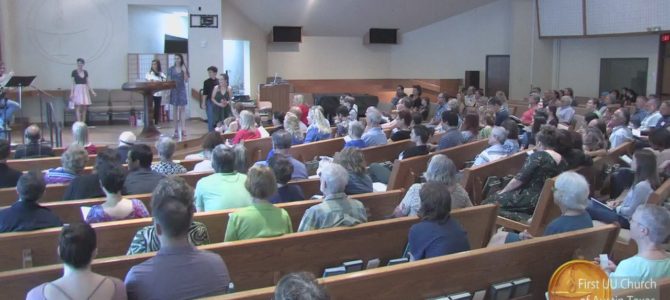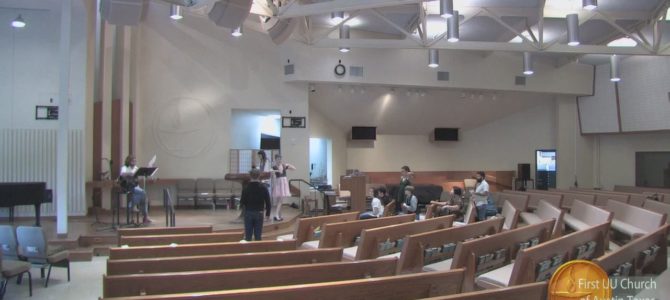Podcast: Play in new window | Download
Senior Youth Group
April 28, 2019
First UU Church of Austin
4700 Grover Ave., Austin, TX 78756
www.austinuu.org
Our Senior High Youth Group lead the service and invite the congregation on a journey in self-reflection, how we’ve grown, and who we’ve become over our lives.
Call to Worship
ELEVEN
by Sandra Cisneros
What they don’t understand about birthdays and what they never tell you is that when you’re eleven, you’re also ten, and nine, and eight, and seven, and six, and five, and four, and three, and two, and one. And when you wake up on your eleventh birthday you expect to feel eleven, but you don’t. You open your eyes and everything’s just like yesterday, only it’s today. And you don’t feel eleven at all. You feel like you’re still ten. And you are-underneath the year that makes you eleven.
Like some days you might say something stupid, and that’s the part of you that’s still ten. Or maybe some days you might need to sit on your mama’s lap because you’re scared, and that’s the part of you that’s five. And maybe one day when you’re all grown up maybe you will need to cry like if you’re three, and that’s okay. That’s what I tell Mama when she’s sad and needs to cry. Maybe she’s feeling three.
Because the way you grow old is kind of like an onion or like the rings inside a tree trunk or like my little wooden dolls that fit one inside the other, each year inside the next one. That’s how being eleven years old is. You don’t feel eleven. Not right away. It takes a few days, weeks even, sometimes even months before you say Eleven when they ask you . And you don’t feel smart eleven, not until you’re almost twelve. That’s the way it is.
Reading
REACHING NONETHELESS
by Sage Hirschfeld
If I could take every word I’ve ever written and ask them what this is all about
I think it might sound something like all the pots and pans in my kitchen falling out from every
overstuffed cabinet and onto the tile floor in a single moment
It would sound like every great and terrible symphony warm up
Like cacophony of chaos already insued
A ruckus of all things sacred in their hardness
Colliding
Greeting each other
Shaking hands with shock waves strong enough to rip through plaster and wood and flesh and
bone
To stir something somewhere you never knew was sleeping till you felt it wake up
To punctuate a period with an exclamation point and then another period.
But that’s not where it would end
It would sound like a collective exhale of everything daring to move
It would sound like doors creaking open throughout the house
Like footsteps down narrow hallways drawing near
Like my father’s voice calling in every shade of compassion
It would sound like hands outstretched in beaconing beyond intrinsic
Beyond first thoughts or old habits or logiced ways
Simply reaching out without truly knowing what for
But reaching nonetheless
Meditation
REFLECTION
by Shel Silverstein
Each time I see the Upside-Down Man
Standing in the water,
I look at him and start to laugh,
Although I shouldn’t oughtter.
For maybe in another world
Another time
Another town,
Maybe HE is right side up
And I am upside down.
Homilies
by Shanti Cornell, Julia Heilrayne, Rae Milstead, Abby Poirier
JULIA HEILRAYNE
Children’s hospitals aren’t like normal hospitals. They are places where we care for our youngest and our most vulnerable. They are places where the juxtaposition of emotions felt covers a spectrum larger than I ever thought possible. In children’s hospitals, the grief that is felt is felt so deeply, so loudly, so intensely, that sometimes it is easy to forget that the joy there is felt just as deeply, just as loudly, just as intensely. Children’s Mercy Hospital in Kansas City, Missouri, the place where I spent a month of the last school year, is no different. From the bubbly decorations to the fish in the MRI machines and the graffiti style cartoon characters that bounce across every wall, it is in essence what a children’s hospital should be: a place to heal, to mourn, to celebrate, and to reflect.
From the branch of the hospital I spent the most time in, you can see the parking garage. This particular parking garage is adorned with an art installation, consisting of colored sheets of glass protruding from the side of the building, casting colorful shadows on the outside wall. In just the right room, standing on just the right section of blue carpeted floor, you can see yourself, reflected in those sheets of colorful glass. Sometimes you are blue, or red, or purple, or green. Sometimes you are clearly defined, so much so that you can see the expression on your face, and other times you melt into the colors, reflections of trees and noises cars coming and going. The first time I saw those glass sheets, the girl reflected back to me was anxiously fiddling with her fingers. There were dark circles under her eyes, and although her hair was pulled back into what might have once been a ponytail, it had since morphed into a clumped tangled mat on the side of her head. The girl was sitting in a wheelchair. As I watched the girl in the glass that first day, she watched me back. Together, we hoped, and we prayed, in our weird atheist UU way, that the doctors here would tell us they could make the pain go away. I left the hospital that day with good news- I was an excellent candidate for the treatment they provided.
Months passed before I was able to travel back to Children’s, and when I did, the girl in the glass was waiting for me, but she had changed. Physical therapists forced the girl to stand, they bent her legs in weird angles and took a million different measurements. The dark circles under the girl’s eyes had grown, and the tears that streamed down her face as the doctors worked on her felt warm and uncomfortable on my cheek. I turned away from the girl in the glass, and she turned away from me.
It was days later, when I let myself glance out the window back towards the parking garage, and the reflection glanced back at me. This time, the girl’s ponytail still looked like a ponytail, and although the dark circles still remained under her eyes, the tears had stopped falling. She looked stronger, better. She looked less like a patient in a children’s hospital and more like the girl I once knew myself to be. I smiled a small smile, and she smiled back, the same small, timid smile.
I continued to watch the girl in the glass grow stronger, watch her legs hold her straighter, watch her arms leave the wheels of the chair far behind. I watched as she became more sure of herself on the treadmill, more able to do the things that most 17 year old girls were doing every day- like walking. The dark circles under her eyes grew lighter, and the smile on her face grew bigger, and slowly, slowly, after days of watching her, I started to recognize myself.
While my friends stressed over studying for finals back in Austin, I learned methods to control the pain that had been plaguing me for years, and the girl reflected back to me in every color of the rainbow did the same. I walked, then ran, then ran a mile. And the entire time, I watched the reflection of myself in the glass. On the hard days, I would check in with me in the glass, and assure her it was going to be ok. On the goo days, I would celebrate with the girl in the glass, and we would carry that success onto the next day. Those seemingly meaningless colorful glass panes gave me a way to watch myself change, in the best possible of way. As silly as it may sound to someone who didn’t spend 8 hours a day learning to walk, run, use their hands, and think again in those rooms, I am grateful to that glass.
I have been home for exactly 4 months and 3 weeks. It has been a glorious 145 days, and as I prepare mentally to go back in June for my 6 month follow up, I can’t help but wonder what the girl who will be reflected back at me into the hospital will look like this time, because the thing that the girl in the glass taught me above all else is that be it staring at yourself in the mirror and having a good chat with yourself, laying in bed with your eyes closed and mediating, or watching yourself go from a self declared “wheelchair sick kid” to the functioning human you want to be in reflections provided by your favorite children’s hospital, to reflect on your progress, change, and accomplishments in life, no matter where you are, is how you keep making that progress, and get where you want to go in life. Or as John Dewey so eloquently put it “we do not learn from experience. We learn from reflecting on experience.”
RAE MILSTEAD
There’s this story in the bible where Jesus goes into the garden of Gethsemane and he kneels down and gives this very agonizing and very human prayer which is “Father, if You are willing, remove this cup from Me; yet not My will, but Yours be done.” Now an angel from heaven appeared to Him, strengthening Him. And being in agony he was praying very fervently; and his sweat became like drops of blood, falling down upon the ground.” This is a time you see Jesus letting himself be doubtful and in pain and quite frankly, afraid of his future. He ultimately decides that God’s will is stronger than his and that he had to lay that burden down as to accept his crucification. You see this same theory in so many faiths where you can’t really change some of the hardest things in life you have to go through and that you cannot will it away. It’s just going to happen and the inevitability of it is probably the most daunting thing.
I believe that every person has to go through those really hard, humanizing moments which I call “brick-wall” moments – because they’re moments in life that absolutely shatter you and force you to grow into a person that you can live with for the rest of your life.
My junior year of High School, my brother committed suicide and not even a year later, my father passed away after a long history of alcohol-abuse and drug addiction. I was 18 and I was fatherless and I had lost someone to suicide. I was just an 18-year-old girl. The days after I lost my brother, I kept to a corner of my room, refusing to eat food or water and I just stared into nothingness- I was shocked as to what kind of world I was now living in. The weeks following, it felt like I was outside of myself, just watching this girl slowly walk through life with this frazzled look. I was devastated and lost. My identity was ripped away from me and I was placed into a completely different universe. What I thought I knew seemed to dissipate and slip through the synapses in my brain. I felt like everyone around me was moving so much quicker and it was impossible for me to reach out and grab onto anything. I was just flying backwards.
I grew up In the church and I saw the bible and Jesus as a collection of lessons on what to do when no one else could give you any advice because the challenge you were given was not something any human could change-like death. I often wondered if Jesus ever stopped to look at himself in a mirror and ask himself first off, How many braids could he make out of his beard? and secondly, what on earth was he thinking?
But he asks himself this and he asks God this in the Garden of Gethsemane. He asks God, why it has to be him? why does he have to bear this pain when he’s done everything he was supposed to? What can He do to get out of this fate? And God gives him the strength and understanding that it was going to be okay. These are the same questions that were asked when I was looking in the mirror at this tear stricken grieving girl who just didn’t know what to do anymore to escape this loss. Why did it have to be me? Why am I the one who has to keep living through this? How do I do this?
For the past month and a half, I have been learning about lent and the core values of the lessons learned throughout this 40 day period. I’ve learned that lent is this time where you take the not so great aspects of your faith and lift it up into the light for you to reflect on it and help strengthen your faith and in the catholic faith, get closer to god. The UU church has a topic for each day to reflect on and share a photo of- things like struggle, vulnerability, courage, dreams, and recovery are amongst these topics. Things that aren’t always pretty or what you would put front and center of your identity but are still definitely there. I’ve found that a lot of people, no matter what your path of spirituality is, find themselves tearing themselves apart which is the exact opposite of what Grace is. I hear my friends in my youth group here that our lives are precious human lives and in my catholic youth group that god will always love me and that no matter where I go in my life, I will always be a beloved daughter of the king most high, yet the hardest part of accepting Grace is giving myself that. How many of us have just mindlessly scroll through facebook or instagram and comparing ourselves to someone else? Or after spending hours watching other people live their lives, felt like a wasted attempt of success? How many of us get a grade back on a test or feedback from a boss or a comment from a loved one and just make that one thing your entire identity and thought process for the next 48 or something hours? It’s self reflection but it’s also painful self-infliction.
I think that’s the greatest human flaw. I watch so many amazing people work so incredibly hard and then tear themselves down. But as I started to read more stories in the bible and read more about all the strongest empowering role models rising up in the social justice world I’ve discovered that no one in the bible made it in the bible by just having an easy life. The strongest people I know have been through some really incredible losses and experiences to get where they are. Jesus knelt onto the ground and SWEAT BLOOD begging to give up what he felt was a burden but was actually the thing that made him so incredibly strong. So yes, I may have no idea who I am or where I am going right now in this world, I do know that me, along with everyone else in this room and outside this room is destined for greatness. We go through things to build character and what you’ve gone through does not define who you are but how you choose to get off the floor of the corner of your room and keep going does. Greatness is defined by the ability to persevere through adversity. And perseverance isn’t always a beautiful A on a calculus test two weeks after your father died. It’s giving yourself the grace to take a day to just cry it all out, even if it’s a full on ugly cry. Questions like “why did I have to be the one chosen to go through these things?” is part of self reflection and building a stronger sense of perseverance through this internalized adversity. You’re doing great and just keep trying to grow from the things that were given to you and wrap each other with this unstoppable love through grace and growth. Perseverance is giving yourself the grace to love yourself and your precious human life, no matter how destroyed life looks.
Text of Shanti Cornell and Abby Poirier’s homilies are not yet available but you can click the play button to listen.
Most sermons during the past 19 years are available online through this website. Click on the index link below to find tables of all sermons for each year listed by date (newest to oldest) with topic and speaker. Click on a topic to go to that sermon.
Podcasts of this and other sermons are also available for free on iTunes. You can find them by clicking on the podcast link below or copying and pasting this link. https://itunes.apple.com/podcast/first-unitarian-universalist/id372427776




